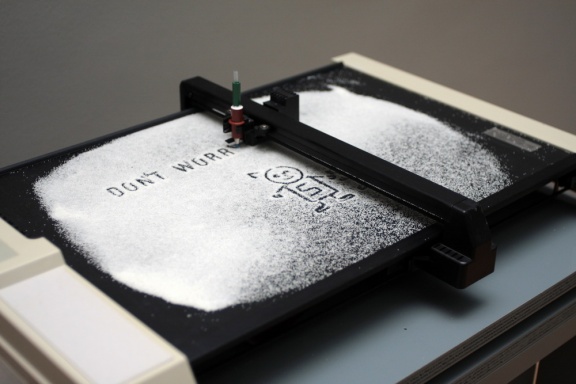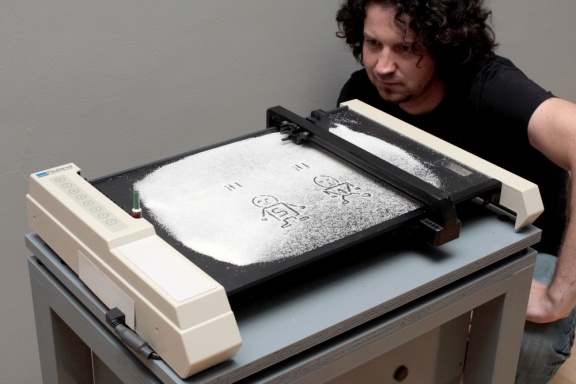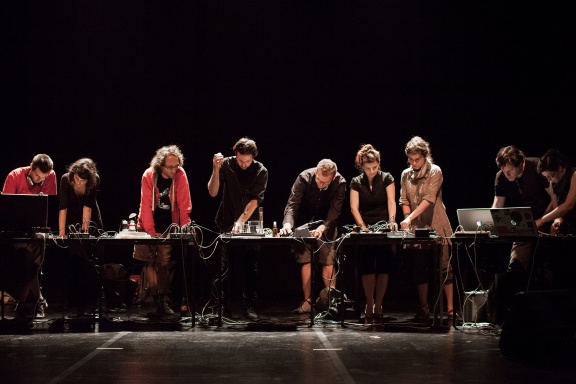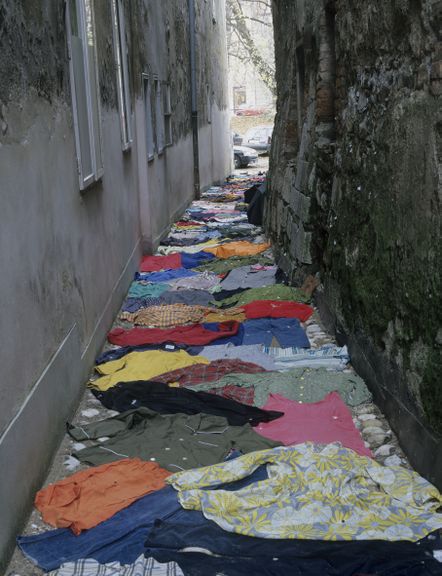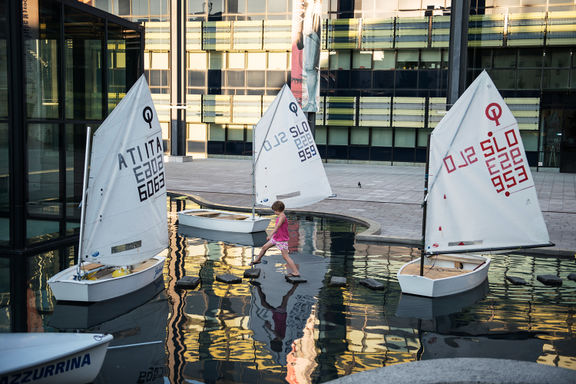Difference between revisions of "U3 Triennial of Contemporary Slovene Arts"
(prvi pregled) |
|||
| Line 6: | Line 6: | ||
{{Infobox | {{Infobox | ||
| name = U3 Triennial of Contemporary Slovene Arts | | name = U3 Triennial of Contemporary Slovene Arts | ||
| − | | localname = U3 | + | | localname = U3 - trienale sodobne slovenske umetnosti |
| − | | street = | + | | street = Tomšičeva 14 |
| town = SI-1000 Ljubljana | | town = SI-1000 Ljubljana | ||
| telephone = 386 (0) 1 241 6800, 386 (0) 1 241 6834 | | telephone = 386 (0) 1 241 6800, 386 (0) 1 241 6834 | ||
| Line 24: | Line 24: | ||
| email = adela.zeleznik@mg-lj.si | | email = adela.zeleznik@mg-lj.si | ||
}} | }} | ||
| − | | frequency = triennially | + | | frequency = triennially |
| dates and duration = 3 months | | dates and duration = 3 months | ||
|photo = [[Image:U3 Triennial of Contemporary Slovene Arts.jpg]] | |photo = [[Image:U3 Triennial of Contemporary Slovene Arts.jpg]] | ||
| Line 31: | Line 31: | ||
{{Teaser| | {{Teaser| | ||
| − | The [[U3 Triennial of Contemporary Slovene Arts]] was established in [[established::1994]] by the [[Museum of Modern Art]] with the aim to provide a periodic overview of the current situation in contemporary Slovene art through the subjective eye of a curator/selector, drawing attention to works which are, according to the selector, the best and closest to the sensibility of the time. To assure a certain level of objectivity, the selector of every second Triennial is a foreign curator, since this emphasises the purpose of the event: to underline differences in aesthetic concepts as well as in professional, critical, cultural, political, and social positions. | + | The [[U3 Triennial of Contemporary Slovene Arts]] was established in [[established::1994]] by the [[Museum of Modern Art]] with the aim to provide a periodic overview of the current situation in contemporary Slovene art through the subjective eye of a curator/selector, drawing attention to works which are, according to the selector, the best and closest to the sensibility of the time. To assure a certain level of objectivity, the selector of every second Triennial is a foreign curator, since this emphasises the purpose of the event: to underline differences in aesthetic concepts as well as in professional, critical, cultural, political, and social positions. Up to know the triennial was curated by [[Tomaž Brejc]], Peter Weibel, [[Gregor Podnar]], Christine Van Assche, [[Jurij Krpan]], and Charles Esche. |
}} | }} | ||
| − | + | ==About editions== | |
| − | + | The curator of the first U3 was the Slovene art historian and critic [[Tomaž Brejc]] and offered a survey. The second triennial of 1997 was curated by Peter Weibel, a multimedia curator, artist and writer, active at Zentrum für Kunst und Medientechnologie in Karlsruhe. Themes were dislocation, discommunication, medialisation, contextualisation, and a critique of the museum institution and art system. His U3 edition stirred a lot of local polemics mostly arguing the potent role of the curator. | |
| − | + | The third triennial of 2000 entitled ''Vulgata'', was conceived by Slovene art historian and curator [[Gregor Podnar]], then the artistic director of the [[ŠKUC Gallery]], and tackled the Slovene national identity based on social constructs. Among others it exhibited the works of [[Marko Peljhan]], [[Tadej Pogačar]], [[Alenka Pirman]], [[Vuk Ćosić]], [[Marko Kovačič]], [[Damijan Kracina]], [[Darij Kreuh]], and [[Maja Licul]]. | |
| − | The 4th Triennial of 2003 with the title ''Here and There'' was curated by Christine Van Assche, a new media curator from the Musée national d'art moderne at the Georges Pompidou Centre in Paris. It concentrated on the concept of the museum, based on the supposition that museums have changed tremendously over the last fifty years. The shifting concept of museums was presented in 20 projects: prints were exhibited on billboards throughout Ljubljana ([[Sašo Vrabič]]), a video was broadcast on TV ([[Davide Grassi]], [[Igor | + | The 4th Triennial of 2003 with the title ''Here and There'' was curated by Christine Van Assche, a new media curator from the Musée national d'art moderne at the Georges Pompidou Centre in Paris. It concentrated on the concept of the museum, based on the supposition that museums have changed tremendously over the last fifty years. The shifting concept of museums was presented in 20 projects that expanded also through other mainstream channels: prints were exhibited on billboards throughout Ljubljana ([[Sašo Vrabič]]), a video was broadcast on TV ([[Davide Grassi]], [[Igor Štromajer]] and [[Brane Zorman]]), the exhibition included projections on the façade of the museum ([[Martin Bricelj]]), a music performance in a theatre ([[Random Logic]]), a project on the Internet ([[Andreja Kulunčič]]), and a project involving visitors' cell phones ([[Vuk Ćosić]]). |
| − | The curator of the 5th edition of U3 ( | + | The curator of the 5th edition of U3 (2006) was [[Jurij Krpan]], artistic director of Ljubljana's [[Kapelica Gallery]]. The exhibition was divided into 4 modules. The first one exposed the ''good practices'', which drew attention to the unexploited possibilities for improving the production conditions in the field of visual arts. The second module featured the exhibition of 11 selected new media art projects by [[Viktor Bernik]], [[BridA]], [[Srečo Dragan]], [[Nika Oblak and Primož Novak]], [[Mark Požlep]], [[Sašo Sedlaček]] and others. The third module, featured in the central room of the triennial, dealt with the analysis of the 20th-century production and public presentations. The fourth module consisted of panel discussions, talks and performances. Several representatives of international art institutions, centres, organisations and networks presented their artist-in-residence programmes. |
| + | The ''Idea for Living'' [Kako živeti], the 6th edition of the triennial was postponed to June 2010 because of the renovation of the [[Museum of Modern Art]]. It was conceived by Charles Esche, current director of the Van Abbemuseum in Eindhoven, who dedicated his research to the reflection on the notion of realism in contemporary art. His selection included the most Slovene artists since the triennial's inception. The exhibition was designed by [[Bevk Perović Arhitekti]] and has featured also the carefully selected historical works from the museum's collection as well as the works by some key figures from ex-Yugoslavian film and art scene. | ||
==See also== | ==See also== | ||
| Line 49: | Line 50: | ||
==External links== | ==External links== | ||
| − | * [http://www.mg-lj.si/node Museum of Modern Art website] | + | * [http://www.mg-lj.si/node Museum of Modern Art website] |
| − | * [http://www.basis-wien.at/avdt/htm/182/00081846.htm The | + | The triennials |
| − | * [http://www.e-flux.com/shows/view/1117 The 3rd U3 on the e-flux] | + | * [http://www.mg-lj.si/node/513 The 6th ''U3'' with recorded statements by C. Esche] on the [[Museum of Modern Art]] website |
| + | * [http://www.basis-wien.at/avdt/htm/182/00081846.htm The 5th ''U3'' on the e-flux] | ||
| + | * [http://www.e-flux.com/shows/view/1117 The 3rd ''U3'' on the e-flux] | ||
{{gallery}} | {{gallery}} | ||
Revision as of 17:05, 4 December 2010
About editions
The curator of the first U3 was the Slovene art historian and critic Tomaž Brejc and offered a survey. The second triennial of 1997 was curated by Peter Weibel, a multimedia curator, artist and writer, active at Zentrum für Kunst und Medientechnologie in Karlsruhe. Themes were dislocation, discommunication, medialisation, contextualisation, and a critique of the museum institution and art system. His U3 edition stirred a lot of local polemics mostly arguing the potent role of the curator.
The third triennial of 2000 entitled Vulgata, was conceived by Slovene art historian and curator Gregor Podnar, then the artistic director of the ŠKUC Gallery, and tackled the Slovene national identity based on social constructs. Among others it exhibited the works of Marko Peljhan, Tadej Pogačar, Alenka Pirman, Vuk Ćosić, Marko Kovačič, Damijan Kracina, Darij Kreuh, and Maja Licul.
The 4th Triennial of 2003 with the title Here and There was curated by Christine Van Assche, a new media curator from the Musée national d'art moderne at the Georges Pompidou Centre in Paris. It concentrated on the concept of the museum, based on the supposition that museums have changed tremendously over the last fifty years. The shifting concept of museums was presented in 20 projects that expanded also through other mainstream channels: prints were exhibited on billboards throughout Ljubljana (Sašo Vrabič), a video was broadcast on TV (Davide Grassi, Igor Štromajer and Brane Zorman), the exhibition included projections on the façade of the museum (Martin Bricelj), a music performance in a theatre (Random Logic), a project on the Internet (Andreja Kulunčič), and a project involving visitors' cell phones (Vuk Ćosić).
The curator of the 5th edition of U3 (2006) was Jurij Krpan, artistic director of Ljubljana's Kapelica Gallery. The exhibition was divided into 4 modules. The first one exposed the good practices, which drew attention to the unexploited possibilities for improving the production conditions in the field of visual arts. The second module featured the exhibition of 11 selected new media art projects by Viktor Bernik, BridA, Srečo Dragan, Nika Oblak and Primož Novak, Mark Požlep, Sašo Sedlaček and others. The third module, featured in the central room of the triennial, dealt with the analysis of the 20th-century production and public presentations. The fourth module consisted of panel discussions, talks and performances. Several representatives of international art institutions, centres, organisations and networks presented their artist-in-residence programmes.
The Idea for Living [Kako živeti], the 6th edition of the triennial was postponed to June 2010 because of the renovation of the Museum of Modern Art. It was conceived by Charles Esche, current director of the Van Abbemuseum in Eindhoven, who dedicated his research to the reflection on the notion of realism in contemporary art. His selection included the most Slovene artists since the triennial's inception. The exhibition was designed by Bevk Perović Arhitekti and has featured also the carefully selected historical works from the museum's collection as well as the works by some key figures from ex-Yugoslavian film and art scene.
See also
External links
The triennials
- The 6th U3 with recorded statements by C. Esche on the Museum of Modern Art website
- The 5th U3 on the e-flux
- The 3rd U3 on the e-flux



